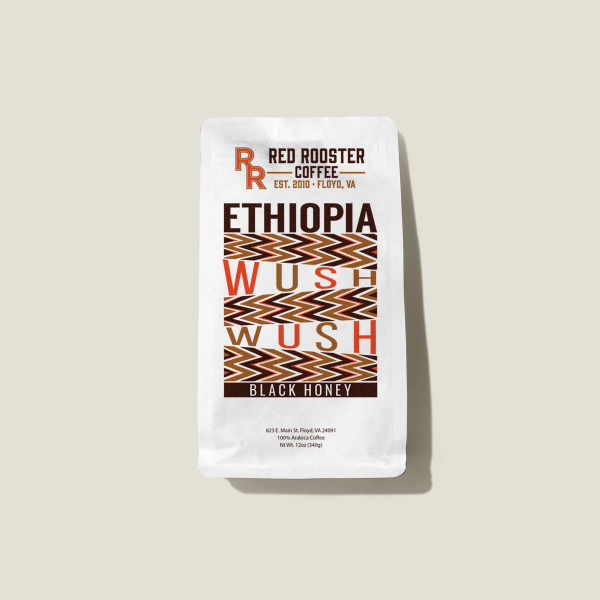Ethiopia Wush Wush Black Honey
12 oz. Bag — $27
This coffee was grown by smallholder farmers in the famous Keffa cloud forests of Ethiopia and black honey processed at the Wush Wush washing station. Fruity and sweet, the cup has a rich honey aroma and medium body, with a mellow acidity and green apple aftertaste.
Tasting Notes
- Ripe Strawberry
- Blackberry
- Blood Orange
Details
Process
Black HoneyVarietal
LandraceElevation
1850 - 1950 maslWashing Station
Wush Wush Dinkalem AdemeGreen Cost
$6.98/lbC-Market Price
$2.13/lbMoka Pot

The Moka Pot can be challenging, with less control over brewing variables and extraction time. But by using the technique explained in these step-by-step instructions, you can brew an exemplary, nuanced cup of coffee.
Sourcing & Processing
The Wush Wush washing station (owned and operated by Dinkalem Ademe) is located in the southwest highlands of Keffa, Ethiopia. Considered by many to be the birthplace of coffee, Keffa is the setting for the story of Kaldi the goat herder. According to legend, Kaldi discovers the benefits of the wild coffee plant by noticing the extra energy his goats have after eating its fruit.
The Keffa zone claims close to 5,000 wild coffee varietals. Most producers in this area (and all of Ethiopia) are smallholders, or “garden farmers". They grow coffee in the “garden” areas around their homes and also harvest cherries from coffee trees growing wild on their land.
Dinkalem Ademe and his wife Sofiya are a dynamic couple devoted to helping their community and protecting the famous Keffa cloud forests. They live in the Wush Wush village with their 6 children. Sofiya organizes charitable work such as education and food distribution. Dinkalem considers himself to be a steward of the land, dedicated to the conservation of local natural resources and features.
Approximately 2,500 farmers, surrounding the Wush Wush village and along the Agama River, bring their coffee cherries to the Wush Wush washing station to be processed. Upon arrival, cherries are carefully hand sorted to remove any that aren't of the highest quality.
To start this black honey process, cherries are placed in a float tank to separate them by density. Only the highest density cherries are selected to be slowly pulped, by a carefully calibrated disc pulper, to remove their skins but leave their mucilage in tact. After being allowed to ferment for a short time, the mucilage heavy coffee is moved to shaded drying beds to slowly dry. This process insures a stable distribution of moisture content throughout the cellular structure.
This coffee was imported by the Ethiopian-owned and woman-led company Catalyst Trade. Zelalem Girma Bayou, Emily McIntyre, and Michael McIntyre are redefining the specialty coffee trade in Ethiopia, Kenya, and Peru by focusing on rewarding the labor of each and every worker and increasing their quality of life.


